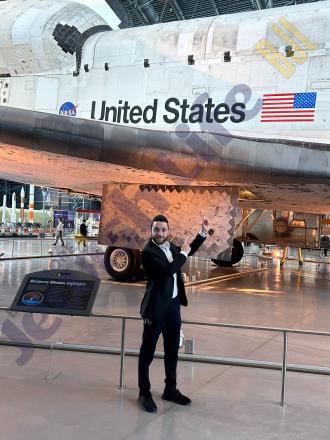After the unfortunate incident of Moshe hitting the rock and discovering that he will not merit entering the Promised Land, Moshe nevertheless forges ahead in leading the nation up to Israel’s border so they may be poised to be handed over to Yehoshua’s able leadership.
As the nation was now situated to the south of the Land of Israel, the first region they attempt to traverse, the most natural direct route due north, is through the territory of Edom, the descendants of Esav. Moshe sends a delegation to the king of Edom with an impassioned plea reflecting on their kinship of ‘brotherhood’, describing his nation’s sojourn through the travails of Egypt where they called out to G-d who heard their prayers and brought them out of the iron furnace. He then kindly requests of them to please allow them to continue on towards their ultimate destination through their land, adding, דרך המלך נלך, on the king’s road shall we travel, promising not to veer off the main road. They adamantly refuse, threatening to confront them with the sword. The Children of Israel present a second petition, offering to travel through roads that would bypass their cities altogether, as well as offering to pay them for any water usage. Once again their appeal is declined as the Edomites march out en masse defiantly, denying them entry. The verse concludes, ויט ישראל מעליו, and Israel turned away from near him.
This entire interaction between the descendants of Yaakov and Esav is uncannily similar to the original actual encounter between their famous ancestors themselves. When making his way back from Charan, Yaakov aware of Esav’s enmity towards him also sends messengers to appeal to Esav’s sensibilities in seeking reconciliation. There too they ultimately part ways with Yaakov making reference to one day meeting up with him in Seir.
The great Sfas Emes, reveals that this intention to travel conveniently through the land of Edom wasn’t a strategy to simply save them time and energy. Yaakov knew that one day the power of the ‘Voice of Yaakov’ would finally overcome the ‘Hands of Esav’, subduing its negative influence once and for all. In his first encounter Yaakov made an attempt to implement that ultimate goal and although it had its affect in quelling the anger of Esav, the time wasn’t ripe for a full conquest. As his descendants were at the cusp of entering the land they too sought to assert the supremacy of the word of G-d over the might of Esav by personifying the purity of their overpowering message that resonated from their very character. They would conquer the hearts of the Edomites, with them submitting to the will of G-d as expressed by the voice of the children of Yaakov.
The time was yet premature for that eventual meeting at the Mount of Seir where the prophet foretells how ‘the saviors will ascend Mount Zion to judge Esav’s mountain, and the kingdom will be G-d’s.’
The Sfas Emes teaches that Moshe’s assertion of דרך המלך נלך, on the king’s road shall we travel, wasn’t a geographical description of which road they would travel but rather a noble declaration that they would carry the banner of Torah and its values proudly, promoting the Almighty’s honor to the benefit of all humanity, prodding all the nations to accept His dominion.
So here we have the ultimate battle lines drawn between the forces of Yaakov and the legions of Esav. This conflict would continue until the final redemption. Until then we would continue to promote the values of Torah by the inspired daily life we live and in the myriad of interactions with the world around us bringing joy and positivity to all aspects of life. At the same time we must remain vigilant in warding off the influences of indulgent self-gratification, dishonest self-promotion, negativity towards people and things that interfere with our selfish and short-sighted perspective and goals, the corrupt legacy of Esav.
No wonder this was where we took our very first step in that long journey to the Land of Israel, that we are still traveling toward. It was providential that this be our starting point so that from the onset we would know precisely where the line in the sand is drawn and wherein lies our greatest challenge in reaching that noble objective to pronounce with utter clarity the ‘Voice of Yaakov’ in all that we do and engage in.
Ben Azzai taught in Avos, אל תהי בז לכל אדם ואל תהי מפליג לכל דבר שאין לך אדם שאין לו שעה ואין לך דבר שאין לו מקום (אבות ד ג), do not be scornful of any person and do not be disdainful of anything, for you have no person without his hour and nothing without its place.
Could the Mishna simply be teaching us that one should be wary of whom you write off because you never know when his moment will come?
The author of this Mishna, Ben Azzai, attests elsewhere that although the famed principle of Rabbi Akiva, to love your neighbor as yourself is termed a ‘major rule’, there is an even greater one. He avers that the verse where the Torah begins to delineate the descendants of Adam that states, זה ספר תולדת אדם (בראשית ה א), this is the account of the descendants of Adam, is of even greater import.
In what way is this verse more significant?
The Chasid Yaavetz interprets the Mishna as a summons to man to absorb the world around him and all its experiences with a positive attitude. G-d gazed into His Torah and created the world, if so then everything that follows from that moment is to be considered an integral part of Torah. He adds, that just as a Torah if it is missing one small detail is deemed disqualified, similarly man must consider and weigh the significance of every man and every experience of this cosmic expression of G-d’s will.
One who scorns, ignores, or shuns the possibilities of discovering this manifestation of G-d in every facet of life is in a sense denying G-d.
In expanding this idea a bit further, the notable Baal Mussar, Rav Shlomo Wolbe, describes what he refers to as ‘Olam HaYedidus’, a ‘World of Friendship’.
The whole of creation is unified and bonded. Aren’t we all children of one Father? All of creation is close to one another, one great family. Us humans have an kinship to earth, after all that’s where we were created from; a closeness to the strata of vegetation, for we too grow; the connection to animal life even more apparent, and it goes without saying the affinity we share for humanity and all races. The ancient nations despised the stranger for they accepted not the notion of our common ancestry; a common Father. For a Jew however, there is no alienation in the world, on the contrary we are commanded to love the ‘sojourner’, the convert.
Elsewhere he writes:
A great closeness predominates between Israel and G-d. The Jew does not approach God with celebration like to a god who is a rare, exalted guest, but like a son who approaches his loving and devoted father. This closeness is pervasive in all areas of life and even gratifies one’s physical life. The closeness between Israel and the Holy One establishes a yedidus and ‘closeness’ between a person and the world. It establishes a very close bond with each Jew, behavior in accord with the ways of peace with all people, caution against causing pain to any living being, and a positive relationship toward everything in the Holy One’s world. This finds expression in the maxim, ‘Despise no one and disdain nothing, for there is no person who does not have his moment and there is nothing that does not have its place.’ When we enter the world of Torah, we find ourselves in the world of yedidus. This yedidus is not an abstract theory. The Torah speaks in the language of action, it gives us commandments. They are what establish the connections between a person and his Creator, between a person and his peers, and between a person and himself. Here there isn’t merely a religious ritual but a lifestyle that encompasses all aspects of life.
Might it be that when Ben Azzai speaks of the ‘account of Adam’ he means to address this very notion? The ‘story’ of man unravels with each positive reaction we have with those people and events that are all integral to that marvelous and continuous story that began with the advent of Man. He thus emphasizes in Avos the value of being attuned to this world of yedidus that finds its full expression in the positive manner in which approach each manifestation of His presence in this wonderful tale called life.
Esav is the very antithesis of this notion. In his myopic view of the world he sees only himself and his needs, incapable of seeing an inviting world of yedidus that beckons us to warm ourselves in His world of friendship. The negativity towards anyone or anything that cannot serve his expectations is ultimately his denial of G-d’s presence in this world.
The very first individual to display scorn in the face of unprecedented opportunity was Esav when he opted to placate his hunger by forfeiting his right to the Bechora, the birthright.
ויבז עשו את הבכורה (בראשית כה לד), Esav spurned the birthright.
It is in contrast to the pessimism of Esav that Ben Azzai challenges us to view the world with an optimism that will not only enlighten all whom we come in contact with but most importantly ourselves.
A recent story was told regarding a husband and wife from Los Angeles, long time teachers, who traveled to the recent Torah Umesorah convention that took place in the Poconos. They rented a car when they arrived to the airport in Philadelphia for the weekend. They were rushing to the airport after the convention to make their flight back home. They arrived at the car return site and were greeted by Kelly a friendly agent handling their return. After greeting her kindly and presenting the rental agreement she pointed out that they failed to refill the tank which would now cost them ten dollars a gallon. After suggesting they were free to find a gas station to fill-up they thanked her but told her they would incur the expense fearing they might miss their flight. She then inquired if they were Jewish to which they obviously responded they were indeed. She wondered aloud about the overwhelming number of orthodox Jews who were frequenting the airport that day. The couple informed her about the teacher convention and the thousand or so participants who travelled there from the throughout the United States and beyond. Having by now fully processed their papers she surprisingly took the document, proceeded to rip it up and told them she would reprocess them without the exorbitant surcharge for gas. Bewildered, they listened to her express a most poignant sentiment. She told them that just three days earlier her beloved bother passed away. Being in no mood to go to work and face the daily pressures and challenges with customers she nevertheless had no choice, due to financial realities, but to go to work. She admitted that before setting out she prayed silently to G-d that she not have to face the usual collection of tired, worn and crabby travelers, otherwise she would surely blow a fuse. To her utter delight the vast majority of people she had dealt with that day were inspired orthodox Jews, whose pleasant manners and kind and thankful attitude had brightened her day allowing her to survive her inner emotional turmoil. (AmiLiving Magazine, Issue 323, aha moments; Rabbi Yoel Gold)
The moral of the story is not that it pays to be nice because you never know when it will save you a couple of bucks. Neither is the lesson that one should always behave nicely since one never knows when their actions will affect a Kiddush Hashem, a sanctification of G-d’s name. It is though about living in a world of yedidus. When we live attuned to the people and experiences around us, knowing that with a positive, optimistic and happy outlook we can draw from the wellsprings of ‘friendship’ that G-d threaded into every patch of life, not only will we live more peacefully but we will avail the planet of G-d’s warm embrace that is ever present for those who are willing to open their eyes.
There are people who focus on the negative, who refuse to see the positive light that emanates from every person despite their shortcomings. They deprive themselves of the happiness that awaits those who are simply willing to discover the good.
אין לך אדם שאין לו שעה, for you have no person without his hour. The Hebrew word שעה, translated here as hour or moment, more accurately means to ‘turn ones attention to’ as when G-d, וישע, turned favorably in acceptance of Hevel’s offering and not Kayin’s. What the Mishna is affirming is every man’s value before G-d, for each of us has a quality that G-d sees favorably.
As with Esav’s torchbearer Edom, when we were shunned by them the Torah reports how ויט ישראל מעליו, and Israel turned away from near him, so too must we not allow other’s negativity to infect our soul, and we must forge ahead with absolute optimism.
The numerical value of ויט, and Israel turned away, is exactly that of ויבז, and he rejected, the negative credo of Esav.
דרך המלך נלך!, On the king’s road shall we travel!
We must always take the ‘high road’, the path of our King, our Father in Heaven, Who desperately seeks our closeness waiting for us to access it in discovering a world of yedidus.
We must never wallow in antagonism and deprecation. We must always aspire to see the bright side in life for in that quality lays our success in living inspired by His presence.
באהבה,
צבי טייכמאן

















